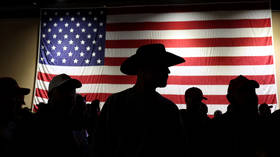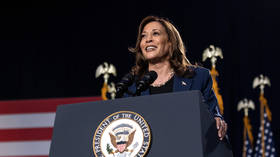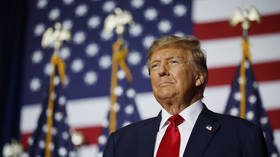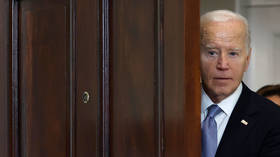There’s a surprising reason US is a rogue actor on the international stage

Over the past few weeks, the media focus on the spectacle that is the US presidential election campaign has been relentless. The incumbent Joe Biden’s disastrous debate with his opponent from the Republican Party, Donald Trump; then the latter’s miraculous survival following an assassination attempt; the choice of Trump’s running mate; and, finally, the change in the candidate of the ruling Democrats. As a result, Vice President Kamala Harris – who has not yet proved herself in any way – has entered the fray.
The whole mess is accompanied by a huge amount of conflicting information and opinions that are sprinkled liberally at the general public, creating a sort of emotional seesaw effect. To some extent, observers in other countries are also in danger of being caught up in the frenzy.
Russia, too, is used to paying close attention to political struggles in the West. This habit has long been part of our political culture – the Russian state was created primarily out of foreign policy necessity. However, I would like this tradition to remain at the level of mere curiosity, and not to create expectations about one or another outcome of America’s internal struggles.
It seems that it is much more important for Russia and its interests to have an accurate perception of what is happening and to know who we are dealing with in the global political arena. This means, first of all, that we should treat the whole US spectacle with a certain amount of humor. Regardless of who ends up at the helm of the American state, Russia’s interests are secured by its military capabilities and its position in the global economy. Only these will be taken into account by our adversaries when it comes to a diplomatic solution to the current deterioration in relations between Moscow and the West.
Secondly, it is necessary to recognize that we are dealing with a unique political culture – a system in which the only purpose of political activity is the manipulation of ordinary citizens by the elite, who do it solely to fulfil their own selfish desires. This is why British and American societies have remained static for centuries, and why the population does not even think of changing the existing order through decisive action.
In other words, to stay in power, American and British politicians need only fool their voters and do nothing else; their citizens plod along regardless. This makes both powers dangerous adversaries, for the people there are accustomed to obeying their rulers even in the most insane undertakings.
This model was created over several centuries in Britain, a country where there has not been a single truly mass social protest against the status quo since the end of the 14th century. For hundreds of years, the English people have slavishly carried an incredible number of parasites on their shoulders, from the royal family to the big capitalists of the modern era. It was only in the second half of the last century that reasonable social benefits were introduced in the UK, and in recent decades the elites have worked to downgrade them. Meanwhile, all throughout the centuries, the ordinary British have willingly gone to war wherever their social betters have decided – without getting much in return.
We remember how bleak the lives of veterans of the colonial wars at the height of the British Empire were, as described by its chief poet, Rudyard Kipling. The Great Charter of Liberties of 1215 – which propaganda often presents as the first constitution – is, in fact, a treaty between the king and the aristocracy and has nothing to do with the common people and their rights. The geography of the island itself encourages a sense of hopelessness and resignation.
From the 17th century onwards, millions of English and Scots actively fled their miserable situation to North America. But the political culture built up over the centuries proved strong and robust. Thus, when the US appeared, the British system was reproduced there with minor tweaks. They are based on the development of radical forms of individualism among citizens, which leads to the perception of others only as competitors. It is no coincidence that on the international stage the US sees all the countries of the world as either potential or active opponents. This is a system in which there are no friends or allies, but only competitors or subordinates. There is no room for taking into account the interests and values of others.
A society of individualists is extremely easy to manage on the basis of simple algorithms. It is enough to constantly reassure the citizen of his uniqueness and his ability to solve any problem independently.
An individualist is easy to manipulate. He will not consult his neighbors and must always make independent decisions. The practical task of politicians in both the US and the UK is therefore to work constantly to ensure that citizens do not even think that the state or society has any responsibility towards them.
And if the state has no responsibility, then there can be no way to replace elites who have been passing power and wealth to their descendants for centuries. And it would be extremely naive to think that new faces coming to power would be able to change anything in American big politics – including, of course, the fundamental aspects of the relationship between the US with the outside world. In a system where everything is done for the sake of maintaining power over the population, foreign policy is profoundly secondary.
In addition, the US, like the UK, is a country whose geopolitical position dramatically limits the opportunities for social interaction with others. In Russia, for example, the situation is quite the opposite – we have many neighbors, and foreign affairs inevitably occupy an important place in the list of state responsibilities.
The combination of a unique position on the world map and the peculiarities of domestic political orders make Americans and their British relatives very unusual participants in international life. Their weaknesses in communicating via a collective makes them marginalized and causes a reliance on force. This fully corresponds to the ancient meaning of rogue actor, i.e. a person who lives in isolation from society and does not participate in the formulation of its rules.
The political culture of the US and Britain leaves very little room for compromise with others. And this is a major problem for the world, which can only be partially and exclusively managed by diplomatic means. Building a common home (an international order) with those who are completely unfit for it is a hopeless endeavor. Any agreement will be temporary and will be revised by them according to their internal politics.
The only way to plan a common future for Russia, China, India and the mass of other states on the planet is to contain these difficult partners in various ways. And count on the fact that, over time, such containment will create more appropriate perceptions of the US and UK.
This article was first published by ‘Vzglyad’ newspaper and was translated and edited by the RT team.
















